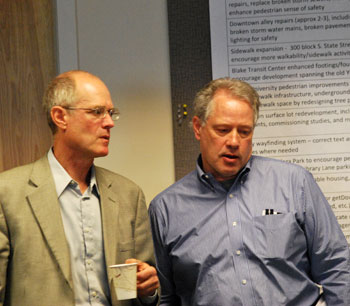Late-Night Bitter Politics Set Stage for May 6
The Ann Arbor city council meeting that started on Monday evening, April 15, 2013 did not end until after 3 a.m. the following day. This was due in part to a stream of about 100 citizens who took the podium for general public commentary and two significant public hearings. The three-minute allocation of time per speaker translated into about five hours of public speaking time.
Conversation amongst audience members at the meeting – as well as subsequently in the community – described the effort as a “citizens filibuster.” The result of all the commentary: Two significant items on the agenda were postponed until the council’s May 6 meeting.
One of those items was the site plan approval for 413 E. Huron. Postponement of a decision on that project was lumped in with the general motion to postpone all remaining action items on the agenda until May 6. It was not necessarily expected that the council would postpone the 413 E. Huron site plan that evening, even if it was hoped by opponents that councilmembers would put off the decision – for a third time.
But there was a reasonable expectation that another significant item would be postponed – the council’s final action on a proposed revision to the city ordinance governing the Ann Arbor Downtown Development Authority. It was during the often acrimonious debate on that decision that the council ultimately opted to postpone all of its remaining action items until May 6.
The acrimony stemmed in part from the fact that the stated intention of Stephen Kunselman (Ward 3) at the start of the meeting was to postpone a final decision – and that was the expected outcome. The fact that this expected outcome was called into question heightened the tension in an already emotional debate. The tension was heightened by the fact that deviation from the anticipated postponement was made possible mainly by the absence of two councilmembers – Marcia Higgins (Ward 4) and Sumi Kailasapathy (Ward 1).
By the time the council reached the DDA ordinance on its agenda, the hour was approaching 2 a.m. And by then Higgins and Kailasapathy had needed to leave the council meeting. Both of them had supported the ordinance changes in the 7-3 vote taken at the council’s April 1, 2013 meeting. But for the final reading on April 15, neither of them were at the table when the debate on the DDA ordinance began.
Kailasapathy described herself to The Chronicle as on the verge of physical exhaustion when she left – having had little sleep over the several days leading up to the meeting. She earns her livelihood as a certified public accountant, and tax season is a time of peak workload.
So apparently recognizing that the absence of Kailasapathy and Higgins would mean defeat for the ordinance change – if it were voted up or down, instead of being postponed – mayor John Hieftje led an effort to force an up-or-down vote on the issue. And councilmembers who were willing to put off the issue were not unified in their view about the parliamentary procedure to use to achieve that delay. So the council voted on two different options – postponing until a date certain (June 17) or tabling the issue. Sabra Briere (Ward 1) provided a crucial vote against postponement, but voted in favor of tabling.
Kunselman argued for the postponement by pointing out that because the sequence of the roll-call vote that evening allowed him to vote last, he could simply assess how the tally stood, and vote accordingly with the prevailing side. That would give him the right to bring back the vote for reconsideration at the council’s subsequent meeting. But Kunselman’s argument was not persuasive to a six-vote majority.
Without a six-vote majority in favor of either tabling or postponing, the council was left to deliberate on the actual ordinance amendments. As some attempted amendments failed – clearly due to the dynamic that had resulted from the absence of two councilmembers – Chuck Warpehoski (Ward 5) eventually proposed adjourning the meeting until the following Monday, when the meeting could continue. However, after a brief recess it was decided that the council would simply postpone all remaining voting items until its May 6 meeting, and put an end to the April 15 meeting.
After approving the motion to postpone the action items, councilmembers ticked through the remaining “housekeeping” items on the agenda, which largely included various reports and communications. Of those, one highlight worth noting was the nomination by Hieftje of Eric Mahler to replace David Nacht on the board of the Ann Arbor Transportation Authority.
The public commentary at the April 15 meeting exceeds The Chronicle’s capacity to report in its customary way. Still, some accounting of the meeting is important for the archives.
This report provides: (1) a summary of votes taken; and (2) a summary of actions that will now appear on the May 6 agenda as a result of the April 15 postponement. In addition, this report begins with details of the deliberations on the proposed DDA ordinance revisions. [Full Story]





